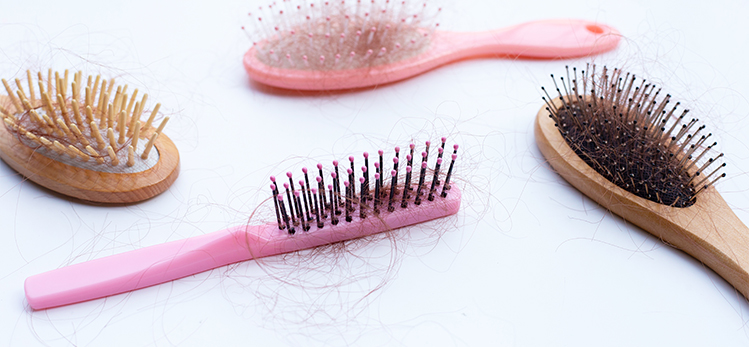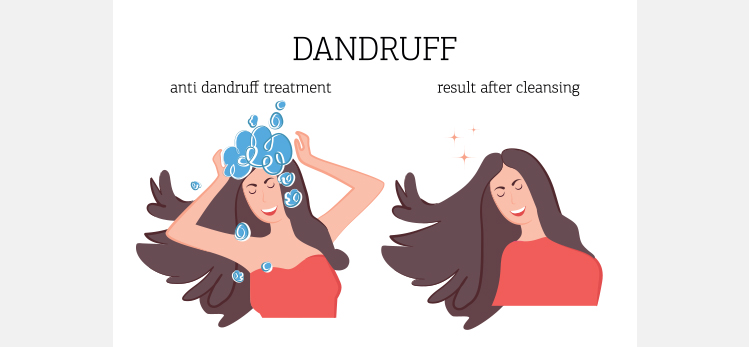How To Prevent Hair Loss From Dandruff?
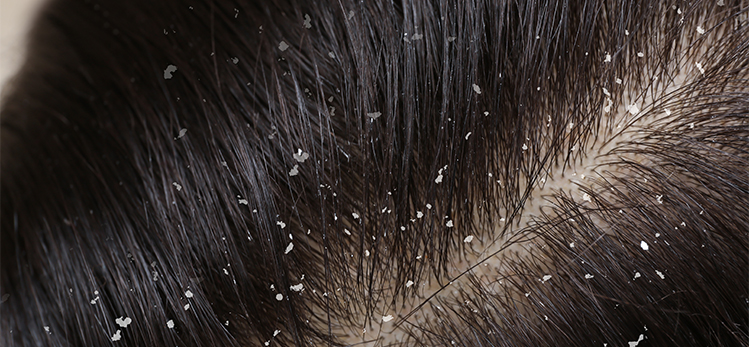
Dandruff is a common scalp condition that leads to tiny dry flakes of your scalp falling off, which are more noticeable on the shoulders, especially when you wear dark clothes. Dandruff can also cause your scalp to dry out further and make it itch. A lot of people suffer from dandruff at some point in their life.
Dandruff Not only causes us uncomfortable due to the itchiness and soreness, it can also be embarrassing socially. But does dandruff also cause hair fall? Many people with dandruff have gone on to develop hair fall issues, but is dandruff directly responsible? Well, read on to know the answers to all your questions.
No. In most cases, there is no evidence of hair fall induced as a result of dandruff. However, most people with severe dandruff and irritated scalp may constantly get the urge to scratch their heads. In the process, it can damage the hair follicles and cause them to loosen up with time. This can be one of the reasons for shedding more than normal hair for people with dandruff. Although this does not lead to an abnormally large amount of hair fall or baldness , it can become an issue for people with more severe conditions like androgenetic alopecia (AGA).
For a mild case of dandruff, start by using a gentle and clarifying shampoo. This will help to remove oil, dead skin cells, and other build-ups on your scalp. For severe dandruff, use a medicated shampoo meant specifically for dandruff two to three times, depending on the type of your hair and the severity of your dandruff.
Dandruff shampoos can be drying on the hair, especially for those who already have dry hair and scalp. In such cases, it is best to use a more moisturizing shampoo for the scalp or follow up a medicated dandruff shampoo with a conditioner to make the hair less parched. For a better understanding of which shampoo is suitable for your hair type, consult a dermatologist who might prescribe one that is best suited for you. Some common dandruff shampoos are:
Other than using medicated dandruff shampoos, it is also essential to treat any underlying cause of dandruff and follow some hair care remedies to keep dandruff and the resultant hair fall under control. Here are some simple ways you can follow to prevent dandruff:
Learn to manage stress: Stress can be a causative factor to so many diseases and health conditions. It can also trigger hair fall, dandruff, or other skin inflammation if the stress is persistent. It is essential to manage stress along with any treatment for the hair. Without this, the effectiveness of any shampoo cannot be long-lasting.
Follow a suitable hair care routine: Whether you have an oily scalp or dry, regular shampooing will always go a long way in ensuring there is no build-up and dandruff in your hair. For keeping dandruff away, follow a hair care routine suitable to your hair type and keep your hair clean and nourished.
So, in conclusion, dandruff cannot be the sole reason for hair loss , but it can lead to itchiness and inflammation that makes the hair follicle prone to damage due to scratching and eventually cause hair fall. While your hair shedding may be a result of an underlying health condition or disease, dandruff can aggravate hair loss, and hence it is always better to treat it to prevent further hair fall.
Myth Busters HairFall
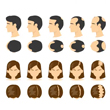
Androgenetic Alopecia - Everything You Need To Know
Have you been experiencing excessive hair fall over a prolonged period of time? It could be an early sign of androgenetic alopecia. It is a hair loss disorder common in both genders and can lead to progressive thinning and even baldness in some patients if not caught and treated early.

How To Make Hair Grow Faster For Men
A head full of healthy hair is a matter of confidence. Hair has its own mechanism of growing and shedding, and it is when this mechanism is thrown off that growth is hindered. Especially in the case of males, hair growth faces a lot of hiccups that can easily be managed.
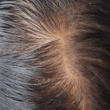
Female Pattern Baldness - Causes & Treatments
Have you suddenly noticed an increase in the number of hair strands on your pillow in the morning? Or is your ponytail getting thinner by day? Well, you might be suffering from female pattern baldness. While that does sound scary, identifying it early on is key to treating this condition effectively. So keep reading to know what this is, how you can identify it, and most importantly, what treatments you can avail of to get your beautiful lustrous hair back.
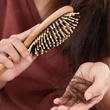
What Are The Reasons For Hairfall?
Almost everyone experiences some amount of hair thinning over the years. Shedding around 50 to 100 single strands of hair per day is considered normal. However, losing more than 150 strands a day, experiencing sudden thinning, or developing circular bald patches on your scalp are reasons for concern. Hair loss occurs when new hair doesn’t grow fast enough to replace the amount of hair you lose daily. Hair can fall due to various reasons, with hereditary hair loss and poor nutrition being the most common hair fall reasons.

Expert Approved Tips For Hair Growth
What can be more debilitating than seeing hundreds of hair strands shedding from your scalp every time you brush your hair? Also, excessive molting occurs during seasonal changes that can be very stressful for you. Although it’s okay to lose between 50-100 strands every day, according to the American Academy of Dermatology, the problem occurs when you start shedding more than normal. But that doesn’t mean you have to feel helpless as there are ways to grow your hair back. Even if you are coping with baldness or alopecia, certain hair growth tips from dermatologists can come to your rescue. Read on to discover how these tips can be your savior when abnormal hair fall problems are in sight.
Trending Videos
+ 3 Sources
LMRC - GGI-CO-A2-DMA-300026127-300026127-WM-J21-282
© 2021 Dr. Reddy’s Laboratories Ltd. All rights reserved.
